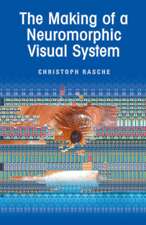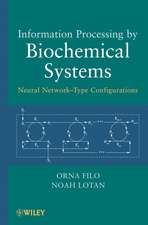Systematic Design for Emergence in Cellular Nonlinear Networks: With Applications in Natural Computing and Signal Processing-: Studies in Computational Intelligence, cartea 95
Autor Radu Dogaruen Limba Engleză Hardback – feb 2008
This book proposes a systematic framework for measuring emergence and a systematic design method to locate computationally meaningful genes in a reasonable computing time. Programs and application examples are provided so that the reader may easily understand the new concepts and develop her own specific experiments. An accessible language recommends it to a large audience including specialists from various interdisciplinary fields who may benefit from a better understanding of emergence and its applications to their specific field.
| Toate formatele și edițiile | Preț | Express |
|---|---|---|
| Paperback (1) | 639.72 lei 6-8 săpt. | |
| Springer Berlin, Heidelberg – 30 noi 2010 | 639.72 lei 6-8 săpt. | |
| Hardback (1) | 645.97 lei 6-8 săpt. | |
| Springer Berlin, Heidelberg – feb 2008 | 645.97 lei 6-8 săpt. |
Din seria Studies in Computational Intelligence
- 20%
 Preț: 449.37 lei
Preț: 449.37 lei - 20%
 Preț: 1158.26 lei
Preț: 1158.26 lei - 20%
 Preț: 986.66 lei
Preț: 986.66 lei - 20%
 Preț: 1452.76 lei
Preț: 1452.76 lei - 20%
 Preț: 168.78 lei
Preț: 168.78 lei - 20%
 Preț: 1291.10 lei
Preț: 1291.10 lei - 18%
 Preț: 1112.30 lei
Preț: 1112.30 lei - 20%
 Preț: 565.39 lei
Preț: 565.39 lei - 20%
 Preț: 649.28 lei
Preț: 649.28 lei - 20%
 Preț: 1047.73 lei
Preț: 1047.73 lei - 20%
 Preț: 1578.96 lei
Preț: 1578.96 lei - 20%
 Preț: 643.50 lei
Preț: 643.50 lei - 20%
 Preț: 657.49 lei
Preț: 657.49 lei - 20%
 Preț: 993.28 lei
Preț: 993.28 lei - 20%
 Preț: 990.80 lei
Preț: 990.80 lei - 20%
 Preț: 989.96 lei
Preț: 989.96 lei - 20%
 Preț: 1165.69 lei
Preț: 1165.69 lei - 20%
 Preț: 1444.52 lei
Preț: 1444.52 lei - 20%
 Preț: 1041.96 lei
Preț: 1041.96 lei - 20%
 Preț: 1047.73 lei
Preț: 1047.73 lei - 20%
 Preț: 1046.06 lei
Preț: 1046.06 lei - 18%
 Preț: 2500.50 lei
Preț: 2500.50 lei - 20%
 Preț: 989.13 lei
Preț: 989.13 lei - 20%
 Preț: 1165.69 lei
Preț: 1165.69 lei - 20%
 Preț: 1164.05 lei
Preț: 1164.05 lei - 20%
 Preț: 1042.79 lei
Preț: 1042.79 lei - 20%
 Preț: 1460.19 lei
Preț: 1460.19 lei - 18%
 Preț: 1403.52 lei
Preț: 1403.52 lei - 18%
 Preț: 1124.92 lei
Preț: 1124.92 lei - 20%
 Preț: 1039.47 lei
Preț: 1039.47 lei - 20%
 Preț: 1008.11 lei
Preț: 1008.11 lei - 20%
 Preț: 1045.25 lei
Preț: 1045.25 lei - 20%
 Preț: 1275.42 lei
Preț: 1275.42 lei - 20%
 Preț: 1040.32 lei
Preț: 1040.32 lei - 20%
 Preț: 988.32 lei
Preț: 988.32 lei - 20%
 Preț: 1169.79 lei
Preț: 1169.79 lei - 20%
 Preț: 1162.37 lei
Preț: 1162.37 lei - 20%
 Preț: 1059.26 lei
Preț: 1059.26 lei - 20%
 Preț: 1164.05 lei
Preț: 1164.05 lei - 20%
 Preț: 1166.52 lei
Preț: 1166.52 lei - 20%
 Preț: 1459.38 lei
Preț: 1459.38 lei - 18%
 Preț: 1005.74 lei
Preț: 1005.74 lei - 20%
 Preț: 997.38 lei
Preț: 997.38 lei - 20%
 Preț: 1055.94 lei
Preț: 1055.94 lei - 20%
 Preț: 1284.47 lei
Preț: 1284.47 lei - 20%
 Preț: 994.08 lei
Preț: 994.08 lei - 20%
 Preț: 1048.72 lei
Preț: 1048.72 lei - 20%
 Preț: 1066.02 lei
Preț: 1066.02 lei - 20%
 Preț: 943.78 lei
Preț: 943.78 lei - 20%
 Preț: 1173.10 lei
Preț: 1173.10 lei
Preț: 645.97 lei
Preț vechi: 807.46 lei
-20% Nou
Puncte Express: 969
Preț estimativ în valută:
123.62€ • 128.59$ • 102.06£
123.62€ • 128.59$ • 102.06£
Carte tipărită la comandă
Livrare economică 15-29 aprilie
Preluare comenzi: 021 569.72.76
Specificații
ISBN-13: 9783540768005
ISBN-10: 3540768009
Pagini: 180
Ilustrații: XII, 166 p. 80 illus.
Dimensiuni: 155 x 235 x 28 mm
Greutate: 0.43 kg
Ediția:2008
Editura: Springer Berlin, Heidelberg
Colecția Springer
Seria Studies in Computational Intelligence
Locul publicării:Berlin, Heidelberg, Germany
ISBN-10: 3540768009
Pagini: 180
Ilustrații: XII, 166 p. 80 illus.
Dimensiuni: 155 x 235 x 28 mm
Greutate: 0.43 kg
Ediția:2008
Editura: Springer Berlin, Heidelberg
Colecția Springer
Seria Studies in Computational Intelligence
Locul publicării:Berlin, Heidelberg, Germany
Public țintă
ResearchCuprins
Natural Computing Paradigms and Emergent Computation.- Cellular Nonlinear Networks: State of the Art and Applications.- Cellular and Natural Computing Models and Software Simulation.- Emergence, Locating and Measuring It.- Exponents of Growth.- Sieves for Selection of Genes According to Desired Behaviors.- Predicting Emergence from Cell’s Structure.- Applications of Emergent Phenomena.
Textul de pe ultima copertă
Cellular nonlinear networks are naturally inspired computing architectures where complex dynamic behaviors may emerge as a result of the local or prescribed connectivity among simple cells. Functionally, much like in biology, each cell is defined by a few bits of information called a gene. Such systems may be used in signal processing applications (intelligent sensors) or may be used to model and understand natural systems. While many publications focus on the dynamics in cellular automata and various applications, less deal with an important problem, that of designing for emergence. Put in simple words: How to choose a cell such that a desired behavior will occur in the cellular system.
This book proposes a systematic framework for measuring emergence and a systematic design method to locate computationally meaningful genes in a reasonable computing time. Programs and application examples are provided so that the reader may easily understand the new concepts and develop her own specific experiments. An accessible language recommends it to a large audience including specialists from various interdisciplinary fields who may benefit from a better understanding of emergence and its applications to their specific field.
This book proposes a systematic framework for measuring emergence and a systematic design method to locate computationally meaningful genes in a reasonable computing time. Programs and application examples are provided so that the reader may easily understand the new concepts and develop her own specific experiments. An accessible language recommends it to a large audience including specialists from various interdisciplinary fields who may benefit from a better understanding of emergence and its applications to their specific field.
Caracteristici
Introduction to emergent computation in cellular nonlinear networks With applications in natural computing and signal processing Includes supplementary material: sn.pub/extras





















